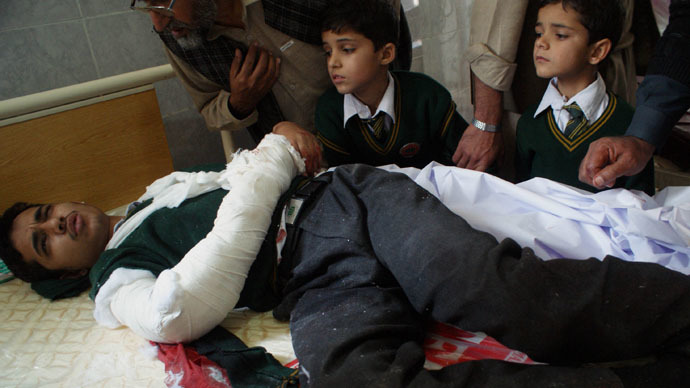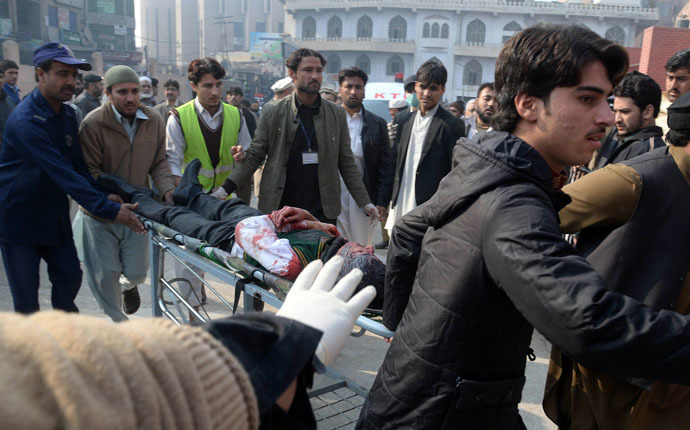‘Taliban seeks media attention, keeping people in fear’

Fear of the Taliban pushes people either to join them or to side with the government and fight them, but civilians mainly tend to join radicals as it is easier to do so, Middle East expert Catherine Shakdam told RT.
RT:Pakistan has long been troubled with Taliban attacks. Do you believe the military was suitably prepared to address this situation?
Catherine Shakdam: I don’t think you can ever be suitably prepared to handle terrorism, and that’s an issue that Pakistan and Afghanistan have had to deal with for the past ten years. I think the problem isn’t either Pakistani or Afghani; the Taliban is operating in both countries. It’s not a question of how Afghanistan troops respond to it or how Pakistan troops respond to it. What we need to do is to look at why the Taliban has been allowed to re-emerge and become so powerful across the region.

RT:We know that there are also foreign forces on the ground, carrying out drone attacks. Could that have contributed to the tension?
CS: Absolutely, if anything, drone attacks have proven to actually radicalize the population and create more anti-American sentiment among the civilian population. That is something that has been seen in Pakistan, Afghanistan, Yemen wherever drones actually appear. I don’t think it’s a solution; it has never been a solution. If anything, it has made matters much worse and created tensions. I think what we need look at, and this conversation I actually had with Prince Ali Seraj of Afghanistan, is that the Taliban is not an Afghani issue. It’s a Pakistani issue; it has been born and created in Pakistan. And when you look how things are backfiring, it’s actually serving Islamabad’s agenda against Afghanistan. That’s something that people to pay close attention to.
Independent journalist Muna Habib on Pakistan: “The Taliban has been threatening for a while that there will be repercussions. If you recall in March of this year, the army launched an operation to drive out militants in the northern areas, this attack today on the school children is a response, retaliation to the attacks on them, on their tribal leaders in the northern regions.”
RT:We've also heard reports that the recent attack comes in revenge for the army’s killing of children. Why children are targeted?
CS: As for the sensational, I think it’s because they want to achieve media recognition, they want to keep people talking about them, fear them and live in a state of fear. This is something that groups such as al-Qaeda, the Taliban and ISIS in Iraq and Syria have done for the past years. It’s working very well for them. It’s in a way helping them to promote themselves into the media forefront and have people talk about them. It’s helping them; it’s helping their propaganda machine to keep running. They want people to live in fear because people in a state of such feeling have two solutions only – either join them as they will assume by joining the enemies they will, therefore, protect themselves and protect their families by engaging with them, or join the side of the government and fight them. Most of the time civilians do tend to join radicals because this is easier for them to do so.

RT:How has the overall strength of the Taliban changed in the region? It seems that it has increased, hasn’t it?
CS: Absolutely, but then again it’s due to the fact that there is no Afghani army to really speak of. It’s a mercenary army. Rather than they neutralize and exploit the tribes as they have done before over the past centuries by enabling tribal leaders to use their tribal force to protect the country, the Americans have created this army that is too sticky to sustain. And of course face towards an army that is almost non-existent and cannot function because they cannot pay the salaries, of course the Taliban is going to re-emerge stronger. And they have utilized poverty as well to radicalize more youth.
RT:What’s the average attitude on the ground in Pakistan when it comes to putting the blame on someone?
CS: People really first blame the government for not doing anything to prevent these sorts of attack. I think after a while they will turn against the Western powers because ever since the Americans and the West have engaged in the region things have gone worse. Sectarian tension has played up, people are feeling generally unsafe. This is what has happened. Ever since the US military set boots in Afghanistan the whole region has gone up in flames. And that is something being replicated across the region, across the Middle East, and that is something that is getting worse. People understand that foreign intervention when it is not asked for by local population, it’s never ever the solution, and only helps to make things worse. We have seen this again and again, but governments do not want to learn from the lessons. They are prisoners of political realities and they are forced by Western powers to play the game.
The statements, views and opinions expressed in this column are solely those of the author and do not necessarily represent those of RT.
The statements, views and opinions expressed in this column are solely those of the author and do not necessarily represent those of RT.












